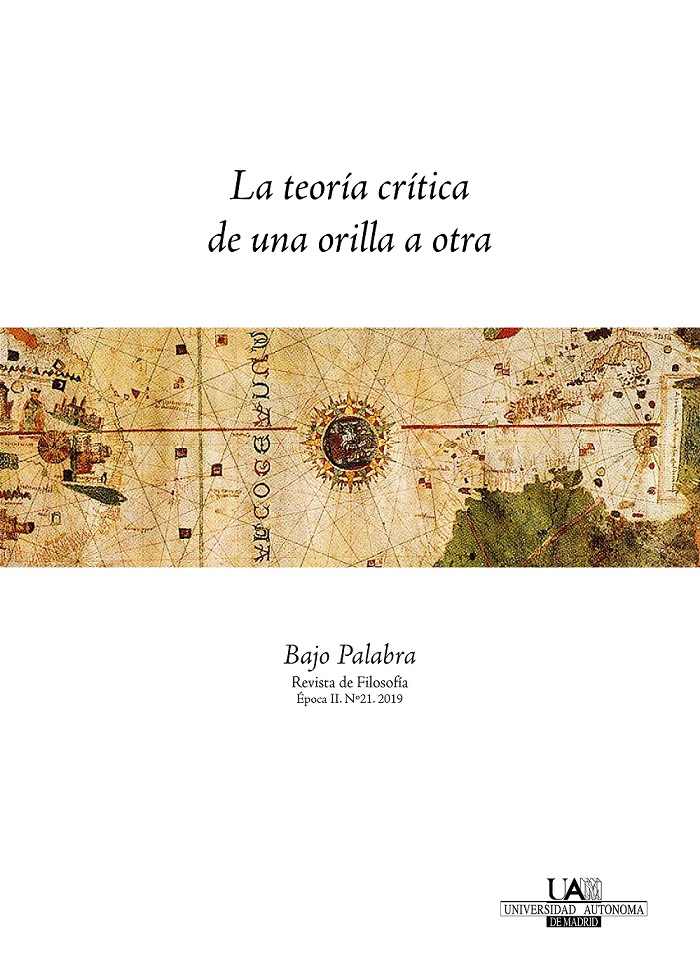Keywords:
Enlightenment, Critical Theory, globalization, eurocentrism, modernityAbstract
In this paper, I am pretending to unfold an argument in favor of Enlightenment without ignoring its problems. I have three reasons for such a defense of Enlightenment. Firstly, I believe that the alternatives that impose themselves when we distance ourselves to far from Enlightenment are not very attractive. Secondly, it is my contention that the potential of Enlightenment has not yet been exhausted. Thirdly, I understand Enlightenment as a “critical cultural practice” that prepares us in a very particular way for the global entanglement of human affirs because it pushes us, time and again, to examine our own cultures critically.Downloads
References
Allen, Amy (2016), The End of Progress: Decolonizing the Normative Foundations of Critical Theory, New York: Columbia University Press.
Chakrabarty, Dipesh (2000), “Postcoloniality and the Artifice of History”, en: Dipesh Chakrabarty (2000), Provincializing Europe. Postcolonial Thought and Historical Diffrence, Princeton/Oxford: Princeton University Press, pp. 27-46.
Cassirer, Ernst (2001), Philosophie der Symbolischen Formen. Erster Teil: Die Sprache, Darmstadt: Wissenschaftliche Buchgesellschaft.
Connell, Raewyn (2007), Southern Theory. The Global Dynamics of Knowledge in Social Science, Cambridge/Malden: Polity.
- (2010a), “The Shores of the Southern Ocean: Steps toward a World Sociology of Modernity” (inédito).
- (2010b), “How can we weave a world sociology?”, en: Global Dialogue, http:// www.isa-sociology.org/global dialogue/ (02.03.2018).
Delanty, Gerard (2005), “Cultural Translations and European Modernity”, en: Eliezer Ben-Rafael et al. (Hg.), Comparing Modernities, Leiden: Brill: pp. 443-460.
Ette, Ottmar (2002), Weltbewusstsein. Alexander von Humboldt und das unvollendete Projekt einer anderen Moderne, Weilerswist: Velbrück.
Habermas, Jürgen (1989), Der philosophische Diskurs der Moderne. Zwölf Vorlesungen, Frankfurt/M.: Suhrkamp.
Horkheimer, Max /Theodor W. Adorno (1990), Dialeltik der Aufklärung. Philosophische Fragmente, Frankfurt/M.: Fischer.
Jullien, François (2017), Es gibt keine kulturelle Identität. Wir verteidigen die Ressourcen einer Kultur, Berlin: Suhrkamp.
Koselleck, Reinhart (2005), “Über den Stellenwert der Aufklärung ion der deutschen Geschichte”, en: Hans Joas/Klaus Wiegandt (eds.) (2005), Die kulturellen Werte Europas, Frankfurt/M.: Fischer Taschenbuchverlag, pp. 353-366.
Kozlarek, Oliver (2014), “Experiences of Modernity and the Modernity of Experience”, en: Oliver Kozlarek (ed.), Multiple Experiences of Modernity. Towards a Humanist Critique of Modernity, Göttingen: Vandenhoek & Ruprecht, pp. 9-41.
- (2016), Postcolonial Reconstruction. A Sociological Reading of Octavio Paz, Berlin/New York: Springer.
Miller, Nicola (2008), Reinventing Modernity in Latin America: Intellectuals Imagine the Future, 1900-1930. New York and London: Palgrave.
Mignolo, Walter D. (2011), The Darker Side of Western Modernity. Global Futures, Decolonial Options, Durham/London: Duke University Press.
Mishra, Pankaj (2018), “Politik im Zeitalter des Zorns. Das dunkle Erbe der Aufklärung”, en: Heinrich Geiselberger (Hrsg.), (2018), Die große Regression. Eine internationale Debatte über die geistige Situation der Zeit, Berlin: Suhrkamp, pp. 175-195.
Romero Cuevas, José Manuel (2008), “¿Qué queda de la Ilustración? Apuntes para un debate”, en: Isegoría. Revista de Filosofía Moral y Política, Núm. 39, julio-diciembre 2008, pp. 153-169.
Rosa, Hartmut (2005), Beschleunigung. Die Veränderung der Zeitstrukturen der Moderne, Frankfurt/M.: Suhrkamp.
Wagner, Peter (2008), Modernity as Experience and Interpretation. A New Sociology of Modernity, Cambridge/Malden: Polity Press.
Wallerstein, Immanuel (2006), European Universalism. The Rhetoric of Power, New York/London: The New Press.
